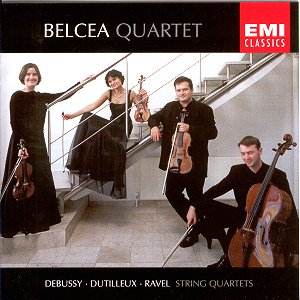Formed in 1994 at the Royal College of Music, the Belcea
Quartet are a promising young group whose progress has already been
partially charted by concert reviews in Seen and Heard [Feb2000
Apr
2000 Dec 2001].
Their multi-national make up obviously is tremendously fertile (they
hail from Romania, Poland and Scotland). They were winners at both the
1999 Osaka International Chamber Music Competition and the Bordeaux
International String Quartet Competition in the same year. In May of
this year (2001) they took the Chamber Ensemble Prize at the Royal Philharmonic
Society Awards.
In a collectively-written statement of intent which
accompanies the disc, they sensibly say that they would like to live
with the Viennese classics a little longer and so decided to turn their
attention to the French repertoire.
The Debussy and Ravel quartets are hardly under-represented
in the catalogue. The musicians claim that they ‘feel a certain attraction
for [this] music – particularly the wonderful freshness of expression
and original sonorities’. The laudable inclusion of the Dutilleux is
not unique, but it does make for a satisfying listening experience (the
Juilliard Quartet issued a disc with exactly this coupling in 1994,
on Sony SK52554). What is special about this group is their sensitivity
to the composers’ wishes: they are particularly close to the Dutilleux,
having worked with the composer on Ainsi la nuit.
The warm performance of the Debussy is characterised
by a certain spring in its step and a lively response to ornaments,
but it is in the still desolation of the slow movement that they seem
to be most at home. The pizzicati of the Scherzo were apparently inspired
by Javanese gamelan: they are imbued with the boundless energy of youth
in this performance.
The Ravel is lighter in texture than the Debussy. Indeed,
the first movement gives the impression of spur-of-the-moment improvisation,
while in reality everything is carefully balanced. The Belcea Quartet’s
sensitivity to instrumental colour means that they can realise the frequent
shifts of the second movement. They bring the same tenderness to Ravel’s
slow movement that they brought to Debussy’s.
Competition is indeed fierce, especially as EMI have
recently re-released the Alban Berg Quartet’s accounts of these two
classics on EMI CDM 5 67550-2 (coupled with works for this medium by
Stravinsky review),
and the Quartetto Italiano’s finely-honed versions are on Philips 50,
464 699-2 (this time, though, with no coupling) review.
But, to their credit, the Belcea Quartet easily keep their head above
the musico-critical waters.
The Dutilleux may well be the deciding factor: the
Belcea Quartet brings an authority beyond its years to their performance.
The players relish the elusive textures and harmonies of this rarefied
atmosphere. Written between 1973 and 1976, this piece has already established
itself in the repertoire as a twentieth-century masterpiece for this
medium. This is difficult but rewarding music, requiring full concentration
both from performers and listeners. It is in seven sections, with four
‘parentheses’. The stasis achieved at times is breath-taking, as is
their almost total immersion In this sound-world, and this account can
sit easily on the shelves with that of the Arditti Quartet on Montaigne
MO782125.
There is little doubt that this disc represents the
flowering of talent of an ensemble that, if they continue on their present
well-chosen path, will achieve great things.
Unhesitatingly recommended.
Colin Clarke


